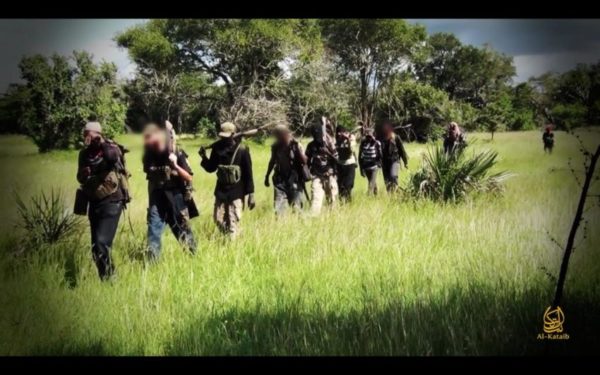
Shabaab fighters in Kenya sometime in 2015
Shabaab, al Qaeda’s branch in East Africa, launched three separate attacks in Kenya and Somalia today, symbolizing its continued lethality. The jihadist group launched a suicide assault on a Djiboutian military base, an ambush on Ethiopian troops, an assassination of a top Somali intelligence official, and an attack on Christians in a Kenyan border town.
In Kenya, Shabaab launched a deadly assault on Christians living in Mandera. According to the BBC, “the target was a guesthouse hosting members of a theatre group who were performing plays in schools in the north-eastern town of Mandera.” This is the second attack on Christians in the area this month. The prior was a “grenade and gun attack” on a residential neighborhood of Mandera.
Shabaab has launched numerous assaults in Kenya in the past. This includes the April 2015 massacre at a university in Garissa, which killed over 140 people. Before that, Shabaab killed dozens after laying siege to the Westgate Mall in Nairobi in 2013. Several smaller attacks have occurred over the years, mainly on Kenyan border towns in Lamu, Garissa, Wajir, and Mandera Counties.
Earlier today, an African Union base north of Mogadishu, manned by troops from Djibouti, was the target of a suicide bombing. Shabaab’s Shahada News Telegram account quickly took credit for the bombing, adding that 17 troops were killed. The African Union gave a different account of the events, however. On its Twitter feed, it said that the car bomb was set off outside the camp and all attackers were killed.
In central Somalia, the jihadist group claimed it ambushed Ethiopian troops near the town of Wabho in the Galgaduud Region. Shabaab gave no definite number of troops killed and Ethiopia has yet to comment on this ambush. Yesterday, Shabaab claimed it took control over the town of Halgan in the Hiraan Region after Ethiopian troops withdrew from the nearby base.
Additionally on the Shahada News channel, Shabaab claimed credit for the assassination of a top intelligence official. According to local reports, the official was killed late last night in Mogadishu as he was walking to a mosque.
In Somalia, Shabaab continues to be a potent force, with the ability to capture territory, despite an African Union-led force in the country. It continues to exhibit the ability to launch complex operations in the capital, and has harassed African Union and Somali forces in both southern and central Somalia. In some instances over the past nine months, Shabaab has been able to recapture the cities of Marka, El Ade, and Badhadhe after both African Union and Somali troops were forced to withdraw. It continues to capture small towns in central Somalia, especially with Ethiopian troops continuing to leave their posts.
Are you a dedicated reader of FDD's Long War Journal? Has our research benefitted you or your team over the years? Support our independent reporting and analysis today by considering a one-time or monthly donation. Thanks for reading! You can make a tax-deductible donation here.








2 Comments
Al Shabaab uses a different tactics in Kenya of the one that it uses in Somalia Al Shabaab targets explicitly at the Christians in Kenya. The number of attacks in Kenya decreased but they are more and more violent. He could involve a diversion while Al Shabaab is meeting of difficulties in Southern Somalia. Al Shabaab has is still ability of leading military operations in the South of Somalia (Jubba and Lower Shabelle), targeting the SNA and UAMISOM troops ?of taking control for a moment of towns however Al Shabaab is unable to conquer militarily the ground: generally the Al Shabaab troops quickly withdraw otherwise they expose themselves to the reactions of the UAMISOM.
Towns which Al Shabaab managed to take the control (Marka in Southern and Moqokori, Halgan, Cel Cali in Central Somalia are not military victories. Each time it is due to the withdrawal of the UAMISOM or the SNA troops. Several reasons in those withdrawals:
defect of paiment of the UAMISOM troops by the EC,
weather conditions, supply conditions, ( Rain season is coming and is making the roads uneasy to use, IED threat. Ethiopian troops food supply depends on local market; Al Shabbab check-point on raods and drought make it hard,
political situation in Ethiopia: Some say Ethiopia withdraws troops due to the political tensions in Ethiopia. However Colonel Kibet, UAMISOM spokesman said it’s due to tactical adaptation to the threats: Ethiopian troops withdrawed from Mokoqori but are still operating in Mudug (as indicates ambush in Wabho). Hiiraaan and Mudug regions remain the first line of defence of Ethiopia to defend its territory. In Mudug ASWJ is a reliable ally but in Hiiraan clan minorities opposed to the central government is a weakness. If the newly crowned Hawadle clan chief Ugas Hassan Ugas Khilaf is still a political opposant, Al Shabaab’s pressures on clan elders to gain influence is great. Al Shabaab had beheaded few of them in recent past. Three days before the Al Shabaab attack a local militia attacked the Djiboutian military base due to a landing conflict, killing at least one Djiboutian soldier. The Al Shabaab’s threat can not solely explain those withdrawals. Al Shabaab is present in Central Somalia especially in Hiiraan but not as active as in Southern Somalia. Since Ethiopian troops defeated them in Halgan earlier this year it do not launch any large scale militarely operation in region.
In its last statements Ethiopian government blames the lack of iconcerns of the EC for security in Somalia. EC worries more to finance programs to prevent African migrants from coming in Europe without considering that lack of security in Africa hinders the development of local economies. Ethiopia removes a part of its troops to keep certainly regiments wich are established along the somalian-ethiopian border.